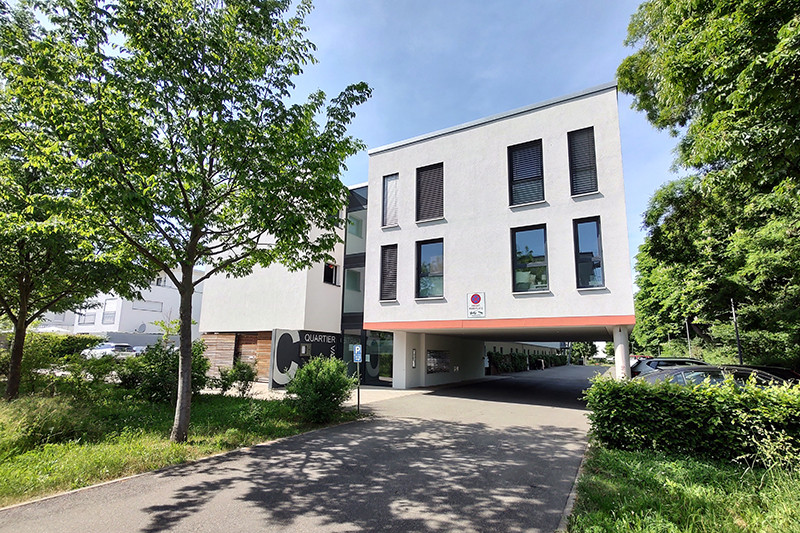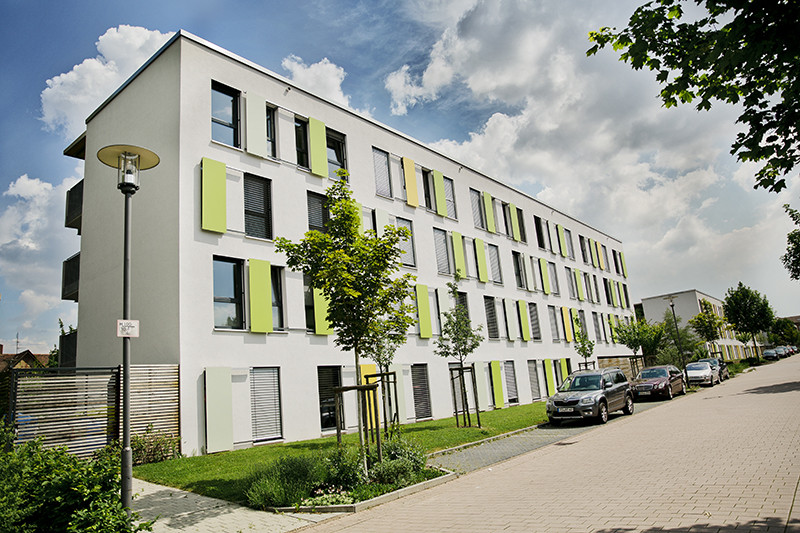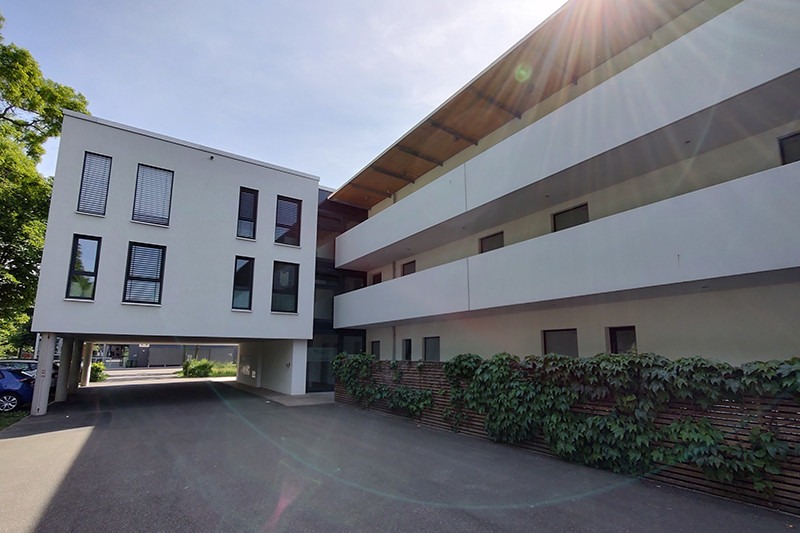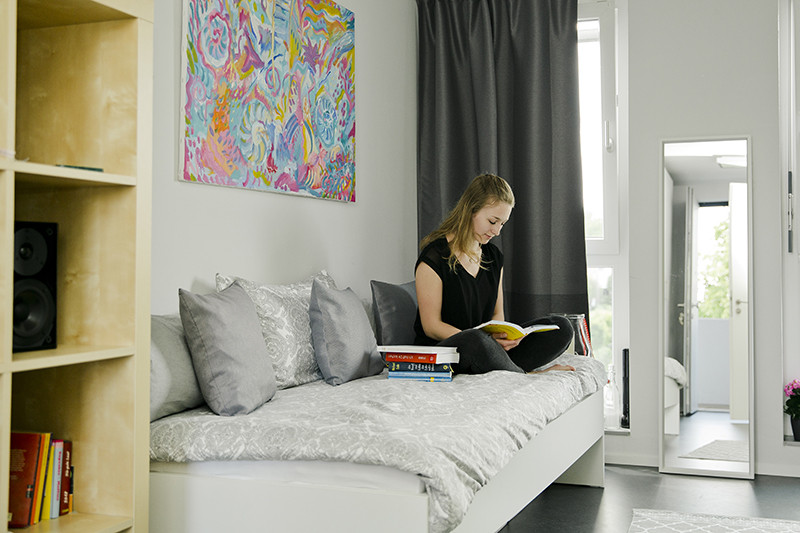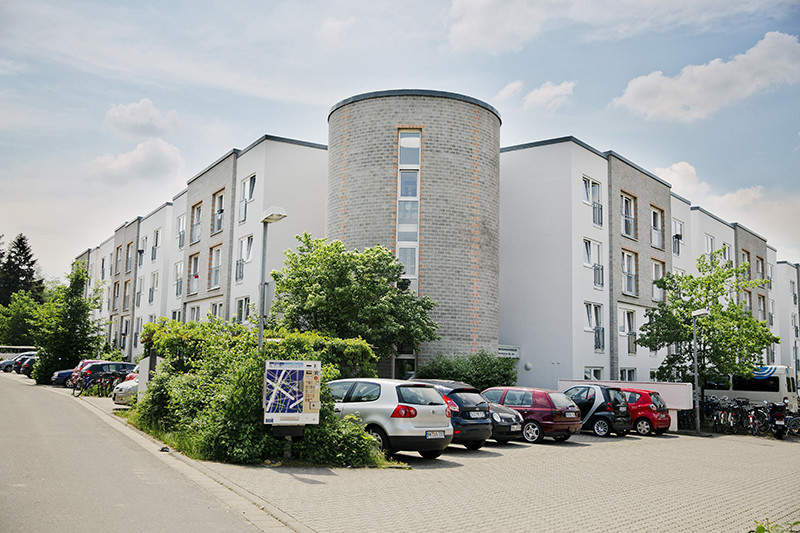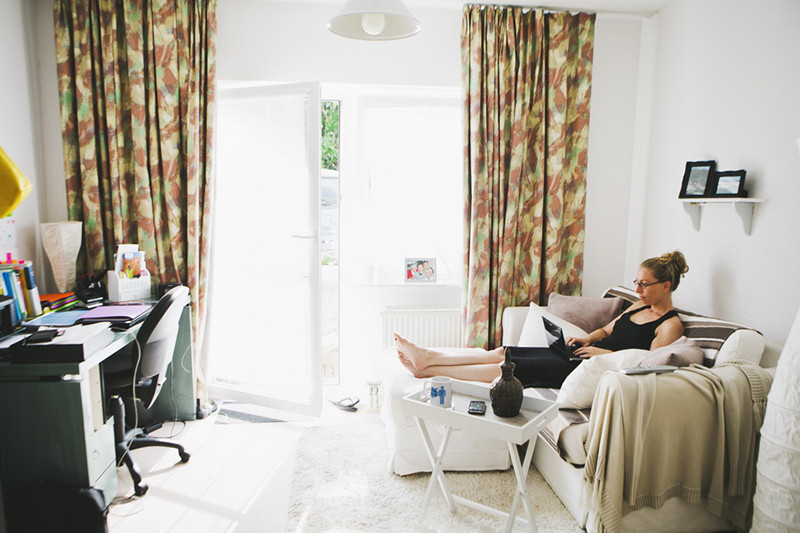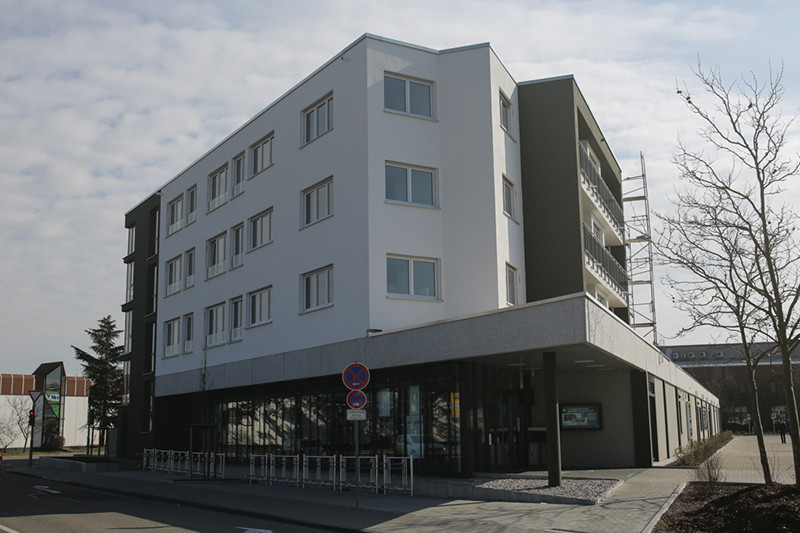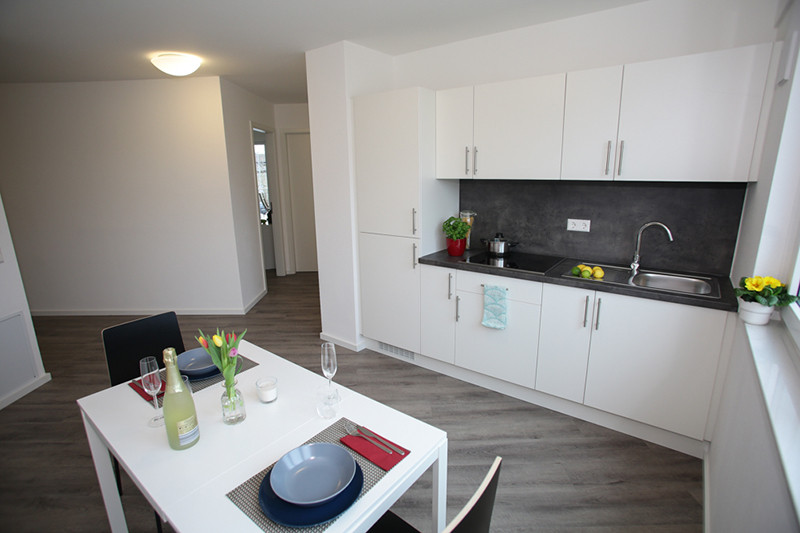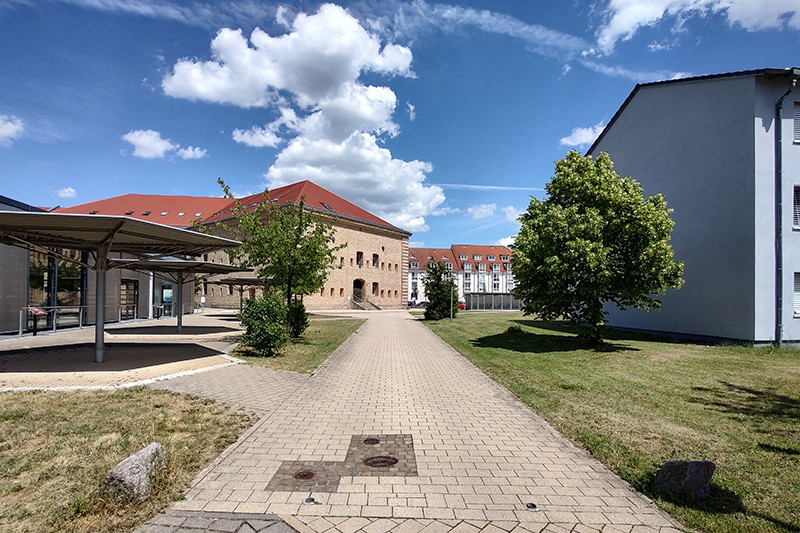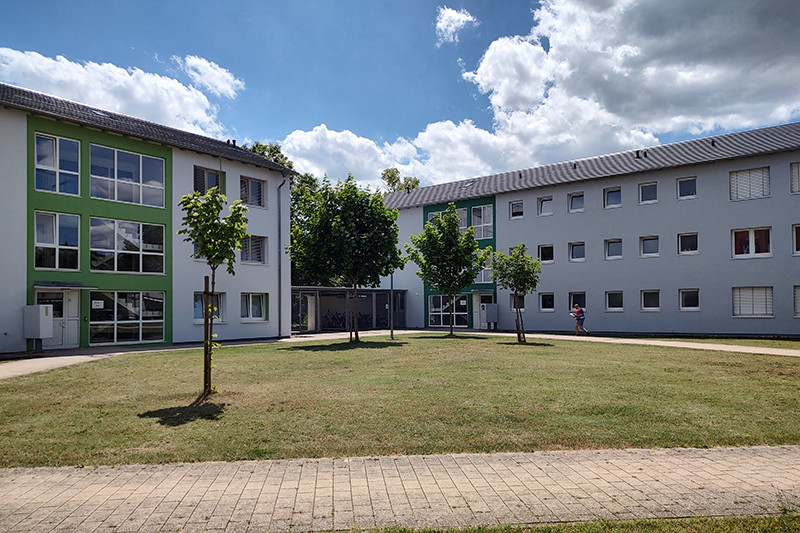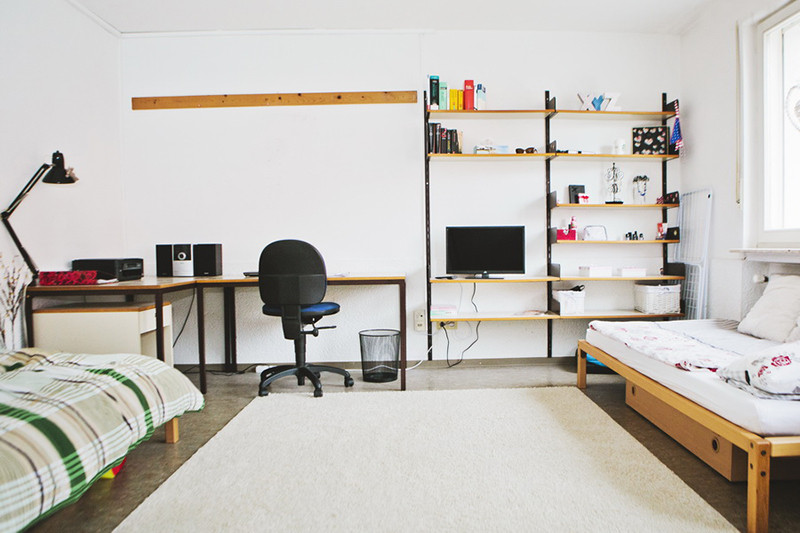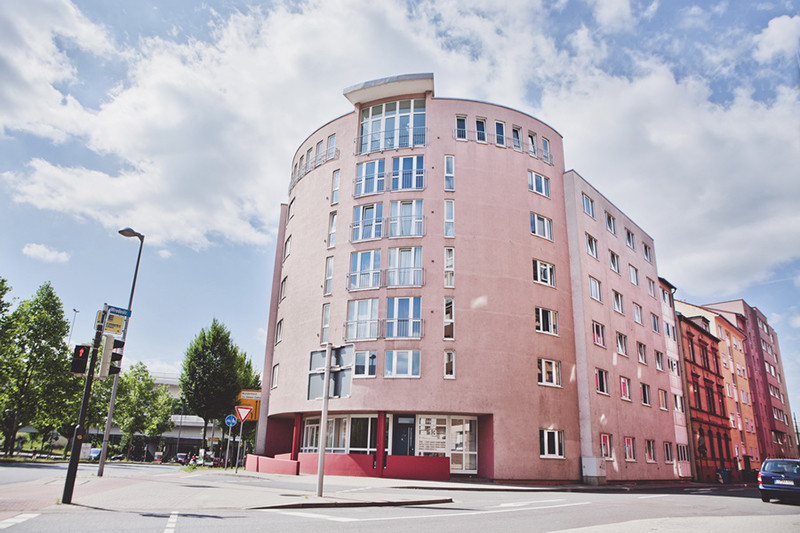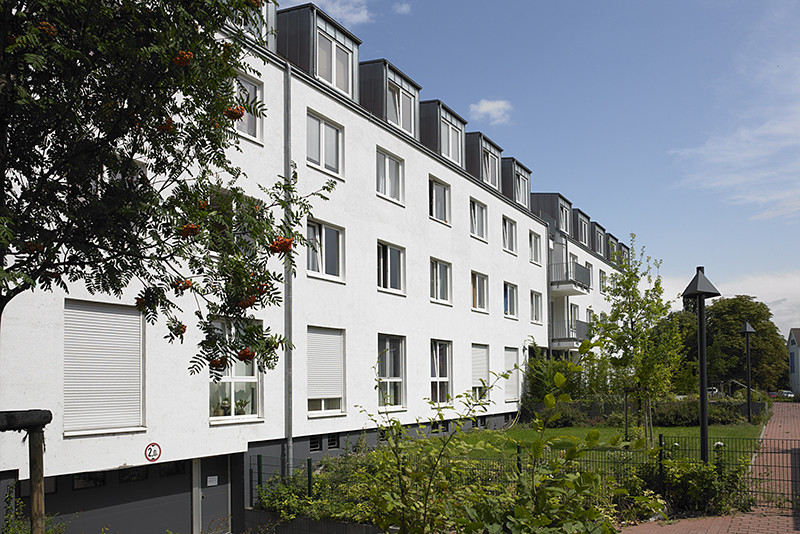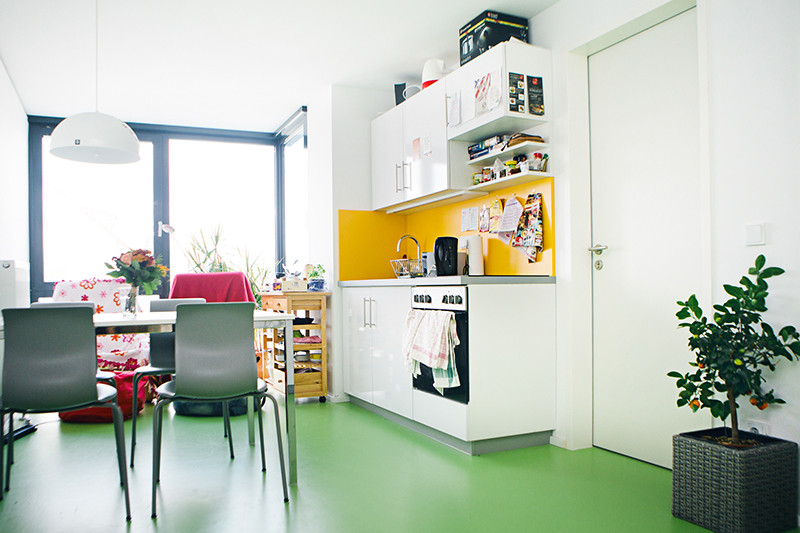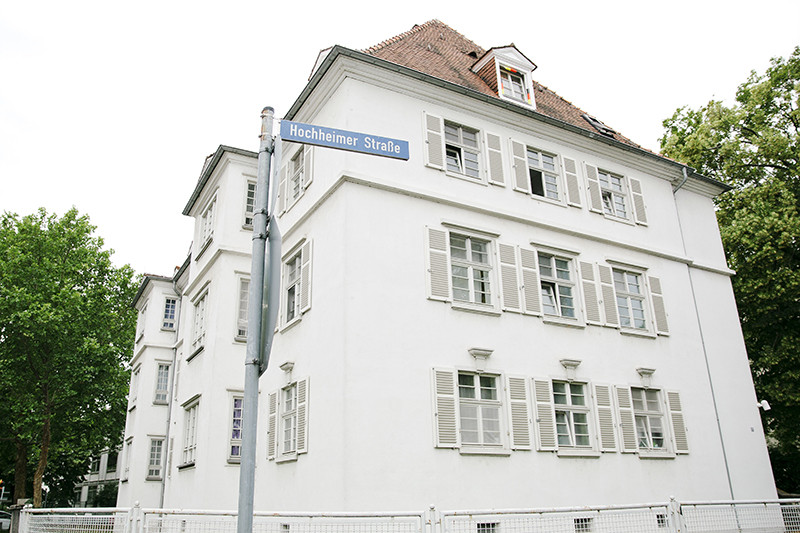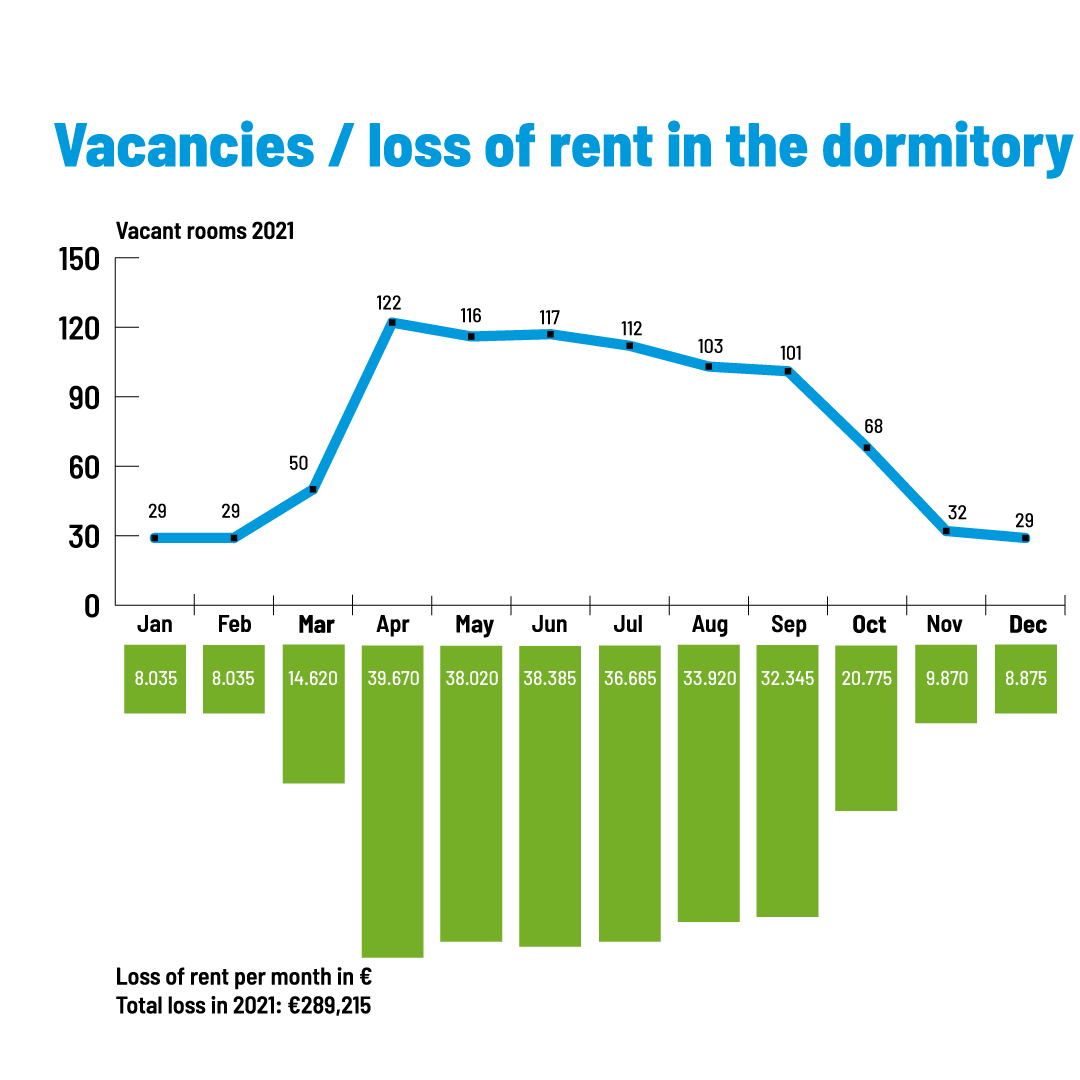Student housing
„Young people who need to find themselves individually and socially need a strong, reliable partner to help them.“
Micha Nebel
Micha Nebel
How important is student housing for a degree programme?
Everyone is always talking about excellent teaching and new degree programmes. But we are firmly convinced that a degree programme is only successful if the general conditions for studying are right. And next to the canteens, adequate living space is probably the most important framework condition for studying. After all, young people begin their first steps into an independent life in our halls of residence. That is why student housing must be a secure and particularly reliable matter. And - in line with the Studierendenwerk's statutory mission - also affordable!Isn't that the case?
To be honest, students in Rhineland-Palatinate have been pretty much left hanging in the past as far as this reliability is concerned. The more than poor student housing market on almost all of our campuses brings a great deal of unrest into student life and also causes social upheaval in the highly competitive housing market. Just about 5.4% of our students have a place in one of our halls of residence. In Rhineland-Palatinate, the figure is about 10 per cent, and nationwide, a quota of 15 per cent has been demanded by all concerned - even by politicians - for decades. Families, the socially disadvantaged and students compete for the same, scarce housing space. Conflicts are inevitable. We experience this every day.
Everyone is always talking about excellent teaching and new degree programmes. But we are firmly convinced that a degree programme is only successful if the general conditions for studying are right. And next to the canteens, adequate living space is probably the most important framework condition for studying. After all, young people begin their first steps into an independent life in our halls of residence. That is why student housing must be a secure and particularly reliable matter. And - in line with the Studierendenwerk's statutory mission - also affordable!Isn't that the case?
To be honest, students in Rhineland-Palatinate have been pretty much left hanging in the past as far as this reliability is concerned. The more than poor student housing market on almost all of our campuses brings a great deal of unrest into student life and also causes social upheaval in the highly competitive housing market. Just about 5.4% of our students have a place in one of our halls of residence. In Rhineland-Palatinate, the figure is about 10 per cent, and nationwide, a quota of 15 per cent has been demanded by all concerned - even by politicians - for decades. Families, the socially disadvantaged and students compete for the same, scarce housing space. Conflicts are inevitable. We experience this every day.
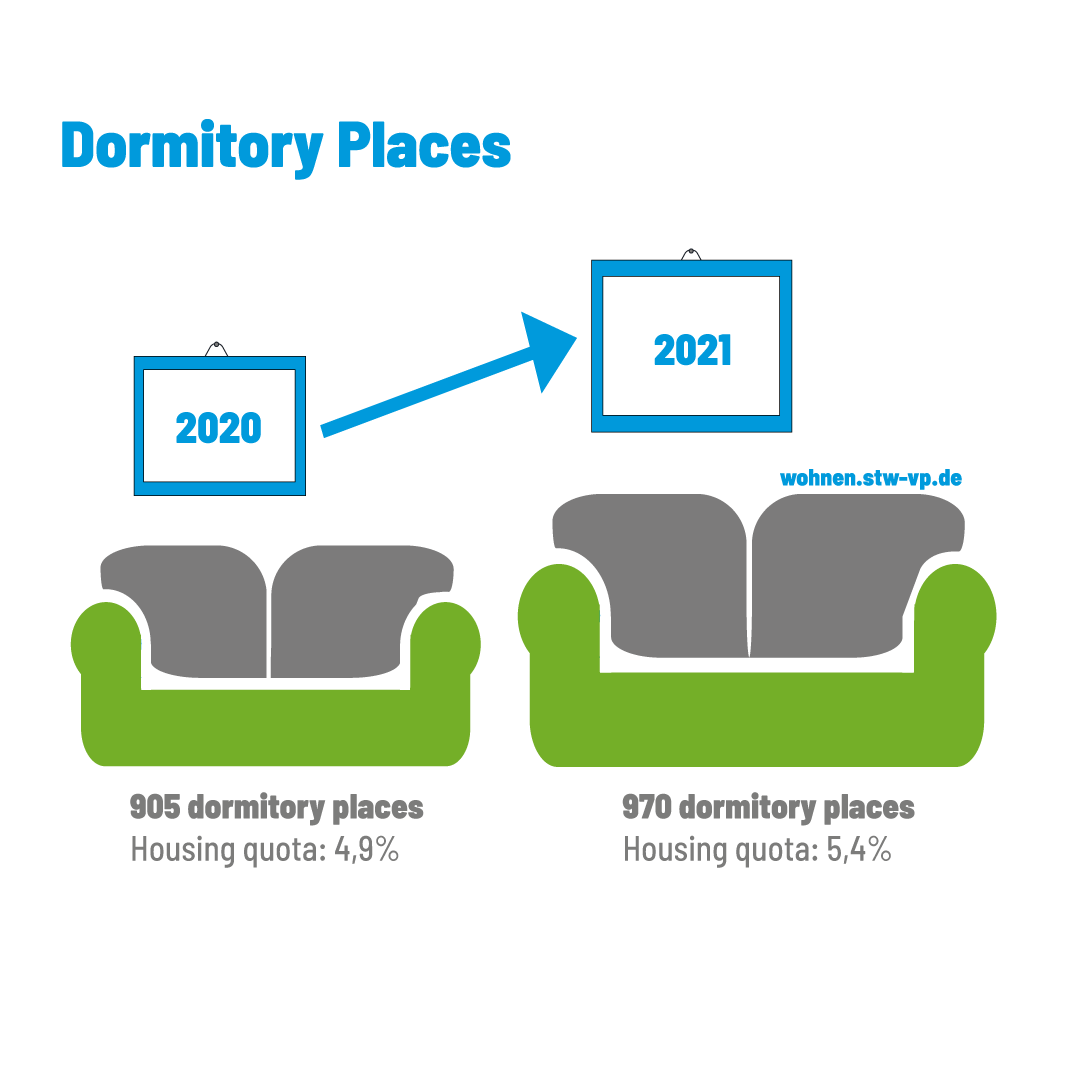
Are all the halls of residence fully occupied?
2021 was a rollercoaster ride. From 7 applicants for one place to extensive vacancies, there was actually everything. Unfortunately, the often last-minute announcements by the universities to continue teaching predominantly online immediately flipped the switch from 700 per cent to minus 700 per cent for us. During the hard lock-down - despite relaxing our allocation guidelines - almost no one wanted a room. When a halfway normal winter semester was announced in late summer, our application list was overflowing again, only to empty out again quickly in autumn. But since you can't conclude rental contracts ad hoc and have to wait for the tenants to report back, this back and forth led to very significant vacancies and a loss of rent of almost 290,000 euros.
2021 was a rollercoaster ride. From 7 applicants for one place to extensive vacancies, there was actually everything. Unfortunately, the often last-minute announcements by the universities to continue teaching predominantly online immediately flipped the switch from 700 per cent to minus 700 per cent for us. During the hard lock-down - despite relaxing our allocation guidelines - almost no one wanted a room. When a halfway normal winter semester was announced in late summer, our application list was overflowing again, only to empty out again quickly in autumn. But since you can't conclude rental contracts ad hoc and have to wait for the tenants to report back, this back and forth led to very significant vacancies and a loss of rent of almost 290,000 euros.
It wasn't easy for the team either, was it?
For my colleagues - regardless of whether they were in rental processing or the property managers - it was an extreme up and down. What was valid today was no longer valid tomorrow. Tenants who were courted today had to be rejected the next day. That was extremely difficult to communicate.
In short, 2021 was occupancy and cancellation hell par excellence. A nightmare for any landlord of temporary housing. The game ended badly for us too - as you can see from the numbers above!
For my colleagues - regardless of whether they were in rental processing or the property managers - it was an extreme up and down. What was valid today was no longer valid tomorrow. Tenants who were courted today had to be rejected the next day. That was extremely difficult to communicate.
In short, 2021 was occupancy and cancellation hell par excellence. A nightmare for any landlord of temporary housing. The game ended badly for us too - as you can see from the numbers above!
Were alternative options for housing offered?
Yes! If that was possible, we referred to the private housing market, of course. We have a digital housing agency at zimmer.stw-vp.de. But honestly, since the situation was the same for everyone, alternatives were pretty much useless. When nobody wanted a room in a hall of residence, nobody wanted to rent a private room in a shared flat either. And vice versa. So we were de facto without alternatives.How did the Housing Department deal with Corona in the halls of residence?
Well, that can be said very quickly: We implemented all the currently valid guidelines at all times. Due to the changing demands from the respective Corona guidelines, this was very strenuous in communicating with the tenants. That's all we can say about it.
What we - and especially our tenants - were not able to deal with sufficiently were the social effects of the pandemic. Since all social contacts were completely forbidden at times, the topic of loneliness and fear was naturally very present in the dormitories. Assaults, littering of the flats and dormitory areas and the visible use of drugs had also increased significantly.We did everything we could to always stay in communication with the students and in extreme cases we could rely on the support of our counselling department. But we were not prepared for such a situation in terms of personnel. Especially since there was always hope that the pandemic situation would improve.
The bridging aid for students was a very important building block for us. Without this state support, many more students would have had to terminate their tenancy agreement with us and our loss of rent would certainly have been twice or three times as high.
After the pandemic, we will also have to deal with the fact that the flats that were permanently occupied during the pandemic are naturally much more "run down" than in normal years. So the pandemic will also bring with it a rattail of premature renovations in our dormitories.
Yes! If that was possible, we referred to the private housing market, of course. We have a digital housing agency at zimmer.stw-vp.de. But honestly, since the situation was the same for everyone, alternatives were pretty much useless. When nobody wanted a room in a hall of residence, nobody wanted to rent a private room in a shared flat either. And vice versa. So we were de facto without alternatives.How did the Housing Department deal with Corona in the halls of residence?
Well, that can be said very quickly: We implemented all the currently valid guidelines at all times. Due to the changing demands from the respective Corona guidelines, this was very strenuous in communicating with the tenants. That's all we can say about it.
What we - and especially our tenants - were not able to deal with sufficiently were the social effects of the pandemic. Since all social contacts were completely forbidden at times, the topic of loneliness and fear was naturally very present in the dormitories. Assaults, littering of the flats and dormitory areas and the visible use of drugs had also increased significantly.We did everything we could to always stay in communication with the students and in extreme cases we could rely on the support of our counselling department. But we were not prepared for such a situation in terms of personnel. Especially since there was always hope that the pandemic situation would improve.
The bridging aid for students was a very important building block for us. Without this state support, many more students would have had to terminate their tenancy agreement with us and our loss of rent would certainly have been twice or three times as high.
After the pandemic, we will also have to deal with the fact that the flats that were permanently occupied during the pandemic are naturally much more "run down" than in normal years. So the pandemic will also bring with it a rattail of premature renovations in our dormitories.
What annoyed you during this time, what was difficult?
The most annoying thing for me is that now - when everything is starting to run normally again - we are being seen as an unreliable landlord. The back and forth has really left its mark on our clients and on us. Of course, we released foreign students in particular - who were unable to start their journey to Germany - from their tenancy agreements, but for the most part we had to insist on the fulfilment of the tenancy agreements in order to prevent even greater damage to the Studierendenwerk. After all, there was no financial bailout fund for the Studierendenwerk like there was for other companies. That didn't necessarily win us any sympathy points. Unfortunately, we had to pass on the uncertainty to our customers and are now working on getting rid of this undeserved crisis image.Where is it good?
Our cooperation with the International Office of the university was very good - the transfer of rooms for international students worked in an exemplary manner.
It was also good that we were able to use the times of regrettable vacancy to renovate empty flats - where necessary - ahead of time. Where does the most urgent improvement need to be made in the area of student housing?
The demands on student housing have risen sharply, both on the part of tenants and on the part of politicians.
The most annoying thing for me is that now - when everything is starting to run normally again - we are being seen as an unreliable landlord. The back and forth has really left its mark on our clients and on us. Of course, we released foreign students in particular - who were unable to start their journey to Germany - from their tenancy agreements, but for the most part we had to insist on the fulfilment of the tenancy agreements in order to prevent even greater damage to the Studierendenwerk. After all, there was no financial bailout fund for the Studierendenwerk like there was for other companies. That didn't necessarily win us any sympathy points. Unfortunately, we had to pass on the uncertainty to our customers and are now working on getting rid of this undeserved crisis image.Where is it good?
Our cooperation with the International Office of the university was very good - the transfer of rooms for international students worked in an exemplary manner.
It was also good that we were able to use the times of regrettable vacancy to renovate empty flats - where necessary - ahead of time. Where does the most urgent improvement need to be made in the area of student housing?
The demands on student housing have risen sharply, both on the part of tenants and on the part of politicians.
- With online universities, it's no wonder that students are demanding high-performance, free and open WiFi at all locations. "Bold WiFi" is increasingly becoming an essential requirement for a place in a hall of residence. In some cases we can already offer 300Mbit in individual halls of residence, but in many this still needs to be expanded.
- What we have known for a long time, but the pandemic has exacerbated: Shared flats are out! Definitely! We've had big problems renting out shared rooms for a long time, but now they're hard to find even with a tight housing market! The future belongs to the one-bedroom flat, although we feel very sorry for the flat-sharing as a social concept. But even the Studierendenwerk cannot make its offers without taking the market into account. As a consequence, we are planning far fewer shared flats in new halls of residence than before. Unfortunately, we cannot easily change the structural conditions in our existing stock and continue to offer the "slow-selling" shared rooms. We can only hope that better times will come for this housing concept.
- From 2026 onwards, we are required to provide all tenants with individual energy cost billing. Although we still have a little more time to meet these requirements due to an exemption, the issue is nevertheless pressing. In view of the energy prices, we think this is the right way and much fairer. Those who consume more energy must also pay more for it. Unfortunately, 90% of our halls of residence have been optimised from energetically better times to collective billing and flat-rate rent. There are no individual water or electricity meters in the flats. In the future, we will have to invest hundreds of thousands of euros to bring our older buildings up to date.
- The issue of hygiene will continue to be a sensitive topic. The permanent equipment with disinfection dispensers, for example, will cause further costs. Also - as already discussed above - the issue of hygiene will also continue to damage the concept of shared flats, since our allocation guidelines mean that you cannot choose your own flatmates...
If I had a magic wand, what would you wish for housing?.
Well, that's easy: as I said at the beginning, here in our campuses we have a dormitory ratio of 5.5 %. In the country, the average is just under 10 per cent. At the federal level, there is always talk of a 15% dormitory quota being desirable for well-functioning university locations. A complete overview of the figures can be found in the statistical overview of the DSW on the topic of student housing.For us, this means that - added up for all locations - we are still 1,708 student housing places short of the 15% target. But no matter how many there actually will be in the future: These halls of residence will only be built if the state of Rhineland-Palatinate finally provides subsidies for the construction of halls of residence. Without subsidies or leasehold land, we will not be able to build new halls of residence that will enable us to fulfil our statutory mandate of "socially affordable rents".
Without subsidies or free land, nothing will distinguish us from private-sector developers and our rents will then also be private-sector rents. A rent of over 410 euros - including energy subsidies - is not a very attractive rent for a city like Landau, for example. For years we have been fighting for understanding from the state of Rhineland-Palatinate. So far without success.What is your prognosis for the future?
I see the "all-inclusive package" as the future. This means that if you come to campus as a student, you get everything from a student card to a place in a hall of residence, to a day-care place, to counselling - all from one source, namely ours.
Our guests from abroad have long been familiar with the "Student Services". Many tenants wonder why this is not the case here. We clearly have some catching up to do in terms of service. But that can only be achieved with more staff.
Electric mobility will also become a strong topic with charging stations at all halls of residence or e-bike sharing. However, there is still legal homework to be done here. For example, it is currently forbidden to charge e-bikes in the bicycle cellar. So you have to create additional, covered outdoor areas at halls of residence as charging stations. Of course, this drives up the price of building new halls of residence and increases the financial pressure for upgrading existing halls of residence.
As of today, I don't see any trend towards declining student numbers. We believe that the pandemic dip will fill again and that digital teaching will not take the place of students doing their studies from their parents' WiFi in the medium term. From a social point of view, that would be alarming anyway - helicopter children without their own socialisation as tomorrow's leaders cannot be our goal.
None of our halls of residence are yet equipped for concepts such as room sharing, short-term rentals or couch surfing. However, we will keep an eye on these trends.
But we have already changed the duration of our tenancy agreements to six months with an option to extend. All tenants can decide informally at the end of the semester whether they still need the room in the following semester and then simply "book in" for a new semester. This makes renting much more flexible.
We know that a new era is dawning in the area of student housing, and we are looking forward to it and are open to all ideas. But - to make it quite clear at the end: only with political clarity and financial support. Otherwise, we will soon no longer be able to fulfil our statutory mandate of affordable rents.
Well, that's easy: as I said at the beginning, here in our campuses we have a dormitory ratio of 5.5 %. In the country, the average is just under 10 per cent. At the federal level, there is always talk of a 15% dormitory quota being desirable for well-functioning university locations. A complete overview of the figures can be found in the statistical overview of the DSW on the topic of student housing.For us, this means that - added up for all locations - we are still 1,708 student housing places short of the 15% target. But no matter how many there actually will be in the future: These halls of residence will only be built if the state of Rhineland-Palatinate finally provides subsidies for the construction of halls of residence. Without subsidies or leasehold land, we will not be able to build new halls of residence that will enable us to fulfil our statutory mandate of "socially affordable rents".
Without subsidies or free land, nothing will distinguish us from private-sector developers and our rents will then also be private-sector rents. A rent of over 410 euros - including energy subsidies - is not a very attractive rent for a city like Landau, for example. For years we have been fighting for understanding from the state of Rhineland-Palatinate. So far without success.What is your prognosis for the future?
I see the "all-inclusive package" as the future. This means that if you come to campus as a student, you get everything from a student card to a place in a hall of residence, to a day-care place, to counselling - all from one source, namely ours.
Our guests from abroad have long been familiar with the "Student Services". Many tenants wonder why this is not the case here. We clearly have some catching up to do in terms of service. But that can only be achieved with more staff.
Electric mobility will also become a strong topic with charging stations at all halls of residence or e-bike sharing. However, there is still legal homework to be done here. For example, it is currently forbidden to charge e-bikes in the bicycle cellar. So you have to create additional, covered outdoor areas at halls of residence as charging stations. Of course, this drives up the price of building new halls of residence and increases the financial pressure for upgrading existing halls of residence.
As of today, I don't see any trend towards declining student numbers. We believe that the pandemic dip will fill again and that digital teaching will not take the place of students doing their studies from their parents' WiFi in the medium term. From a social point of view, that would be alarming anyway - helicopter children without their own socialisation as tomorrow's leaders cannot be our goal.
None of our halls of residence are yet equipped for concepts such as room sharing, short-term rentals or couch surfing. However, we will keep an eye on these trends.
But we have already changed the duration of our tenancy agreements to six months with an option to extend. All tenants can decide informally at the end of the semester whether they still need the room in the following semester and then simply "book in" for a new semester. This makes renting much more flexible.
We know that a new era is dawning in the area of student housing, and we are looking forward to it and are open to all ideas. But - to make it quite clear at the end: only with political clarity and financial support. Otherwise, we will soon no longer be able to fulfil our statutory mandate of affordable rents.
Your contact person for this department
Micha Nebel
Head of Student housing
Xylanderstraße 17
76829 Landau
Tel.: +49 6341 9179 150
wohnen@stw-vp.de
wohnen.stw-vp.de
Micha Nebel
Head of Student housing
Xylanderstraße 17
76829 Landau
Tel.: +49 6341 9179 150
wohnen@stw-vp.de
wohnen.stw-vp.de
